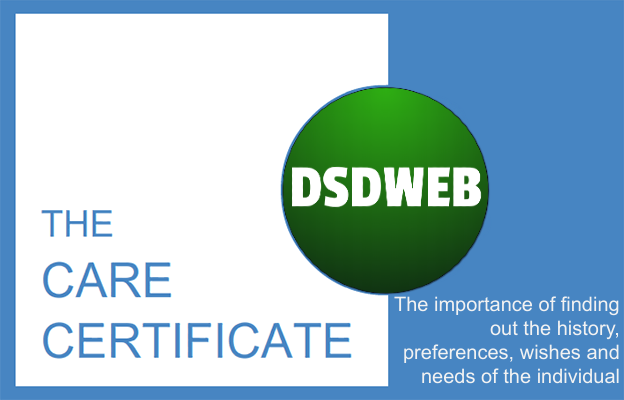This page is designed to answer the following questions:
- 5.2a Describe the importance of finding out the history, preferences, wishes and needs of the individual (Care Certificate, Standard 5: Work in a person-centred way)
- 5.2b Explain why the changing needs of an individual must be reflected in their care and/or support plan (Care Certificate, Standard 5: Work in a person-centred way)
- 2.1 Find out the history, preferences, wishes and needs of the individual (Level 2 Diploma in Care, Implement person-centred approaches in care settings)
- 2.2 Apply person-centred values in day to day work taking into account the history, preferences, wishes and needs of the individual (Level 2 Diploma in Care, Implement person-centred approaches in care settings)
- 2.1 Work with an individual and others to find out the individual’s history, preferences, wishes and needs (Level 3 Diploma in Adult Care, Promote person-centred approaches in care settings)
NOTE: This page has been quality assured for 2023 as per our Quality Assurance policy.
A person-centred approach means putting the individual receiving care at the centre of their care provision and collaborating with them to design a bespoke care package that works for them and takes into account their unique history, preferences, wishes and needs.
- History – helps you to understand the experiences that have shaped the individual and made them the person they are today; provides an understanding of their relationships with others (e.g. their family, friends etc.); may be able to identify the causes or triggers of previous issues and add safeguards/interventions to the care plan to prevent the issues re-occurring; genuine interest helps the individual feel valued and builds a bond of trust
- Preferences – informed by the individual’s values, culture and beliefs; helps to develop a care plan that takes these into account (e.g. the individual may not eat meat for religious reasons)
- Wishes – the individual’s hopes, goals and ambitions; helps to tailor a care package that supports an individual to achieve their dreams
- Needs – the things that they need full support with, the things that they need partial support with and the things that they can do independently
Therefore, it is essential to involve the individual receiving care in the planning process from the outset.
By communicating with the individual, you can identify their specific needs and preferences and use this information to develop their care plan. This should be used in conjunction with other sources of information such as from the family or close friends of the individual, other professionals that know the individual well (e.g. social worker, community nurse, psychologist etc.) and any existing documentation such as health files, Multi-Disciplinary Team (MDT) meeting minutes or transition notes from their previous care provider.
If you do not take the time to really get to know the individual and have them actively contribute to their own care plan, it is unlikely that the support you provide will be useful to them. In addition, individuals will be much more likely to accept and adhere to a care plan they have had an active role in creating.
Doing the research before creating a care plan allows you to gain a deeper insight into what the individual needs, and you can ensure that it is tailor-made to the individual’s requirements. It also means that the individual will have more control over their care provision resulting in increased independence, more self-esteem and increased overall well-being.
It is important to understand that an individual’s care plan is dynamic and should be updated as and when an individual’s needs, wishes and preferences change. It should also be regularly reviewed with the individual to identify any changes that need to be made. These could be changes in circumstances (e.g. an individual spraining their ankle) or changes in an individual’s preferences (e.g. they would like to learn how to cook their meals independently). For individuals that have rapidly changing needs, such as those receiving care in nursing homes, handover reports are essential for ensuring all care workers are aware of any changes.
You can demonstrate person-centred values that take into account an individual’s history, preferences, wishes and needs in your day-to-day work by conversing with them and ensuring they are happy with the actions and tasks you are completing. You may also be able to make suggestions about how a particular task could be carried out in a better way and ask them if they would be happy to try out the new method.

